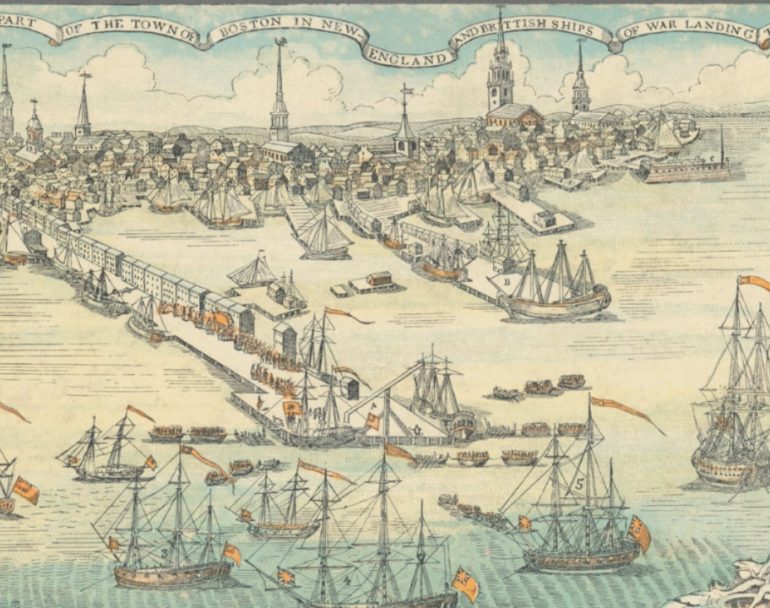
Today in History: Enforcement of the Boston Port Act Begins
By: Dave Benner
Today in 1774, Britain began enforcement of the Boston Port Act, passed in response to the destruction of the tea a few months earlier. One of the Coercive Acts (or, as many of the colonists called them, the “Intolerable Acts”), the law closed Boston harbor completely, preventing all shipping and loading of goods.
The law required the people of Boston to furnish funds to pay for the destroyed tea. Officially, the blockade would impede the “landing or discharging, lading or shipping of goods, wares and merchandise at the town and within the harbor of Boston” until that point. Many of the colonists responded with outrage, as the policy seemed targeted at the colony as a whole rather than those who had participated in the actual event.
Ships of the British Royal Navy began patrols along the entire mouth of the port, and forces of the British Army under the command of Thomas Gage began to occupy the harbor. Enforcement of the Boston Port Act had severe economic ramifications on the colony, where Boston’s maritime system of commerce was brought to a complete standstill. Merchants could no longer earn a living, the price of food skyrocketed, and many faced starvation. New England towns sent huge amounts of grain to Boston. Other colonies, such as South Carolina, also sent relief supplies to the colony.
According to Mercy Otis Warren, the law had thrown Massachusetts “under the yoke of bondage.” Warren saw the treacherous law as a catalyst for civil resistance against the crown. If the people of the colony were “at last pushed to extremities,” she wrote, “the civil sword” would “never be brandished over our heads.” This broke the bounds of the British constitutional system, she claimed, and brought about “the instrument of tyranny.”
More than anything, the Boston Port Act riled multitudes that had previously adopted a nuanced position between the radicalism of the Sons of Liberty and the moderation of the Tory loyalists. Those that were on the fence were now severely affected by the act’s tragic affects, rousing the flames of independence like no previous incident had. It wasn’t so much how colonists perceived the crown and the nature of British supremacy over the colonists, but the way British Parliament responded to Massachusetts’ acts of resistance, that inspired many to the revolutionary cause.
Sympathizers within other colonies began to align themselves with the beleaguered colony. While few called for outright independence, the plight of Massachusetts led many to question the motives of the British government for the first time, and contemplate its coercive power over the North American colonies. Beyond that, the act was one that spurred the colonies to call for a Continental Congress, where delegates from each colony would meet to consider and determine a concerted colonial response to the law.